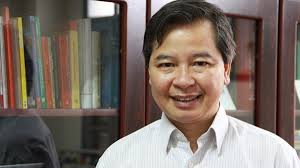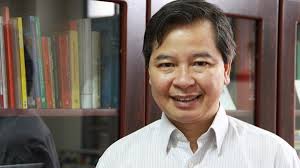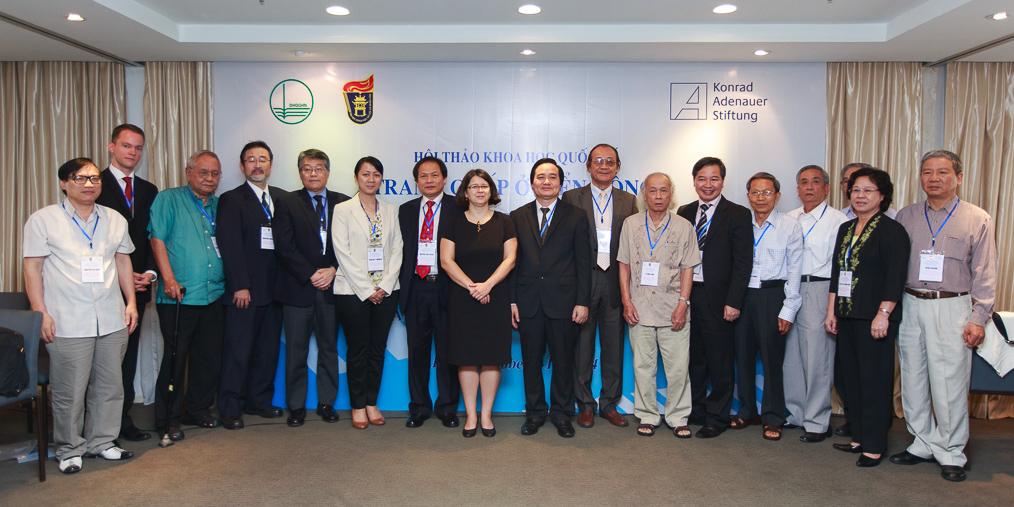
- Professor, what are the differences between this international conference organized by the University of Social Sciences and Humanities and previous conferences on the South China Sea?
This seminar is being held in the context of China's forced premature withdrawal of the Haiyang 981 oil rig from Vietnam's exclusive economic zone and at a time when ASEAN is determined to achieve its goal of building the ASEAN Community by 2015. Furthermore, the seminar is being held as the Vietnamese Government remains committed to resolving disputes peacefully, based on respect for international law, the Declaration on the Conduct of Parties in the South China Sea (DOC), and actively negotiating the development of a Code of Conduct in the South China Sea (COC).
The conference was attended by scholars from countries within and outside the region, such as Germany, Indonesia, Japan, the United States, and the Philippines, representing diverse and multifaceted voices.
Notably, the workshop was attended by numerous leading Vietnamese experts such as Major General Le Van Cuong, former Director of the Institute for Strategic Studies, Ministry of Public Security; Dr. Tran Cong Truc, former Head of the Government Border Committee; Prof. Dr. Do Tien Sam, former Director of the Institute for Chinese Studies, Vietnam Academy of Social Sciences; Assoc. Prof. Dr. Nguyen Vu Tung, Director of the Institute for East Sea Studies, Diplomatic Academy of Vietnam...

Assoc. Prof. Dr. Pham Quang Minh/Photo: baomoi
- The main theme of the workshop is "Impacts and approaches to peace and cooperation." Could you please elaborate on this theme and the objectives of the workshop organizers?
This is the fundamental difference of this year's South China Sea Conference. China's placement of the Haiyang 981 oil rig in Vietnam's exclusive economic zone from May to July 2014 was a dangerous act, violating the United Nations Charter and international law. It not only directly threatened Vietnam's sovereignty but also affected the peace and security of the entire region and the world. Therefore, the conference aims not only to clarify the causes, motives, and impacts of the Haiyang 981 rig incident, but also to comprehensively and multi-facetedly assess China's long-term strategy and schemes in the South China Sea, thereby proposing peaceful and cooperative approaches for the entire region.
With that objective in mind, the workshop was divided into five closely related and complementary sessions. First, the South China Sea issue was examined within the context of strategic competition between the United States and China, viewing it as a crucial factor influencing the current and future regional security architecture. Next, the workshop focused on the legal aspects of the issue, considering it key to a fundamental, peaceful, and civilized resolution of sovereignty disputes in the South China Sea. Following this, the workshop also addressed the dispute through the sharing of experiences in peaceful conflict resolution from other regions and countries in Europe and Japan. Finally, the workshop engaged in a frank and open discussion about the role of ASEAN in the South China Sea sovereignty disputes, emphasizing ASEAN's central role as an indispensable factor in the struggle for influence among major powers and the lack of an effective conflict resolution mechanism in the region.

Domestic and international delegates pose for a commemorative photo at the conference/Photo: Thanh Long
- What were the most notable outcomes of the discussions at the workshop?
The workshop took place in an academic atmosphere, with frank and open exchanges, helping all parties understand each other's perspectives, thereby aiming to build a network for sharing information and research results in the future.
The conference once again contributed the voice of second-channel diplomacy – the voice of academics – an indispensable and crucial dialogue channel of modern diplomacy widely recognized worldwide. An academic approach will make a practical contribution to protecting national sovereignty as well as regional peace and security. A common theme shared by all reports is the complex, intertwined, and long-standing nature of the sovereignty disputes in the South China Sea, and therefore, solutions must be comprehensive, persistent, flexible, and combine political, diplomatic, and legal approaches in a coordinated manner.
- Professor, what were the opinions expressed at the conference regarding the current situation of disputes in the South China Sea?
The world today is more interdependent than ever, and this interdependence forces all nations to carefully consider their decisions. Based on this, it can be predicted that a war or armed conflict in the region is unlikely. However, scholars also suggest that China will gradually implement "coercive tactics," led by civilian forces backed by military forces, to legally consolidate control over disputed waters. To counter this scheme, countries must pursue proactive diplomacy, strengthen defense cooperation, and enhance capacity building.
ButAs a leading training and research institution, what is the University's current and future concern regarding issues related to the South China Sea in particular and maritime sovereignty in general?
As a leading training and research center in the country, the University has conducted numerous research programs on maritime sovereignty, the foreign policies of major powers, and ASEAN cooperation. This is one of many seminars on the South China Sea that the University has organized, with the participation of international and Vietnamese scholars. "Academizing the South China Sea," strengthening international cooperation in training and research on the South China Sea, thereby raising awareness and understanding of maritime sovereignty issues, and resolving disputes peacefully on the basis of international law will be one of the University's important directions in the future.
Thank you, Associate Professor.
Author:Thanh Ha
Newer news
Older news